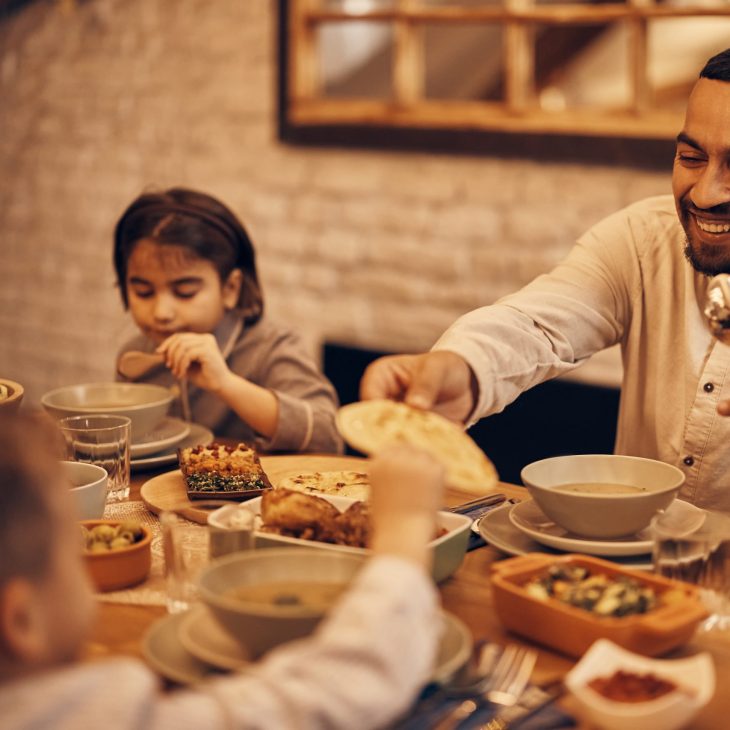Why Ramadan is a Time for Reflection and Gratitude
March 24, 2023

With the birth of the new moon, Muslim communities around the world began the month of Ramadan at sundown on Wednesday, March 22. Many of us have physically and spiritually prepared for the religious commitments that come with every Ramadan: fasting from pre-dawn to sunset, giving charity, congregating with community for worship, and turning inward for sacred rejuvenation.
The beauty of Ramadan for the American Muslim community lies in the diversity of observance. There are many ways families and cultures celebrate and practice during this month, while being collectively anchored in some specific sacred rituals that are consistent across Muslim communities. Every household gathers in the pre-dawn hours to eat the “suhoor” meal before starting their fast. At sunset, we gather again to open our fasts at “iftar,” the meal that marks the completion of a day of fasting. Mosques host a congregational prayer called “Tarawieh” which only occurs during Ramadan, and during these prayers, we recite the Quran from beginning to end in 30 days.
Being the mother of racially and ethnically mixed children, our Ramadan practice always reflects a mix of my kid’s Indian-Palestinian-Irish American heritage. The iftar table regularly features butter chicken, humus, and fries — a combination that would have completely humored and confused my Indian grandmother. Our prayers have always been bilingual, easily switching back and forth between Arabic and English. Our devotional music is almost always in Urdu songs and poetry, which is the religious music of my childhood. And in our own small way, my family is an example of the diversity that is the American Muslim community.
The beauty of Ramadan for the American Muslim community lies in the diversity of observance.
This year my oldest son, Sulayman, is excited to fully participate in the ritual of fasting. As I prepare to parent him and help him navigate his Ramadan practices at school, I have been thinking about two lessons I want him to internalize from this month into the rest of his year.
Ramadan is a time for remembrance and reconnection.
The Prophet Muhammad received his first revelation of the Quran (the holy scripture for Muslims) in Ramadan. According to the Muslim tradition, the Prophet had retreated to a cave called Hira outside of Mecca, which was his contemplative practice. The angel Gabriel appeared before him and said, “Read!” to which the Prophet replied, “I cannot read.” Gabriel then commanded the Prophet to recite the following verses: “Read! In the name of your Lord who created you…” This first command, to “read,” resonates with me in literal and symbolic ways. One of the most common practices of Ramadan is to engage in reading the Quran — communally and individually. For those of us who do not have fluency in Arabic, the language of Muslim scripture, it is common to engage with translation and commentary of the Quran. And through studying it, remembering and reconnecting with the stories and lessons that anchor many parts of Muslim life but can get lost in the day-to-day shuffle of life. Ramadan invites us to re-connect with the purpose and intentionality of the Muslim faith.
Ramadan is a time to set and practice new intentions.
My grandfather regularly told me, “If you want to start a new habit, start it in Ramadan,” implying that pairing the new habit with the practice of 30 days of fasting helps to embed it in one’s life. Every Ramadan, my family tries to incorporate a small new habit to our existing daily religious practices. Last year, I invited my children to join me in writing a daily gratitude list at our dinner table and then sharing what we were thankful for. We learned we were thankful for the delicious food made by grandmothers, for LEGO, for Nutella and M&M’s, for old friends and new. Thus, learning a little about each other and us in the process. This year, I hope we can continue to make our gratitude lists and add another element by also recording one act of generosity we’ve practiced in our day, whether it is a simple act of saying “hello” to our neighbors, or helping a friend at school, or donating to a local organization.
Ramadan is a sacred time. It is also a communal and familial time. This month is about honing our individual spiritual practice while also fulfilling our commitments to the people in our lives. I’m grateful to have a chance each year to reflect on my own spiritual practice as a Muslim and to renew how I show up in our world. My invitation and hope for you this Ramadan is for you to have an opportunity to do the same.
Share
Related Articles
Higher Education
American Civic Life
American Civic Life



